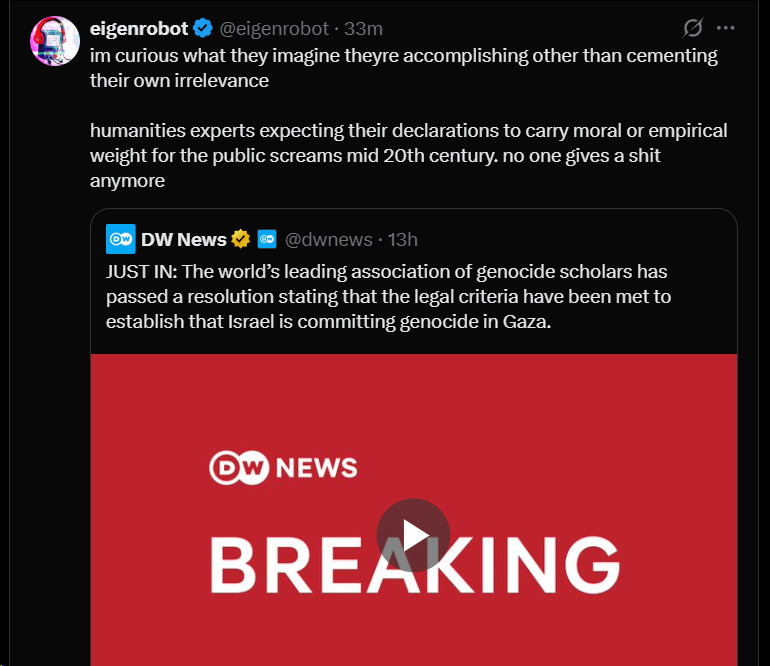The Twilight of Authority
Declarations in an Age That No Longer Listens
DW News reported that the world’s leading association of genocide scholars passed a resolution declaring Israel’s conduct in Gaza meets the legal definition of genocide. Once, such pronouncements carried weight. Today they vanish into the noise.
Eigenrobot’s quip captures the moment: humanities experts expect their declarations to matter, but the public has stopped caring. This is not simply cynicism. It is the collapse of a twentieth-century structure of authority.
The Mid-Century Dream of Intellectual Authority
In the aftermath of World War II, intellectual elites were installed as moral arbiters. Philosophers, historians, and legal scholars helped write the conventions that defined crimes against humanity. The Nuremberg trials, the Genocide Convention, and the Universal Declaration of Human Rights all bore the fingerprints of academic expertise. To “speak as a scholar” was to borrow the moral capital of civilization itself.
That capital has been spent. Humanities departments became just another faction in the culture war. Their credibility dissolved not because their subjects ceased to matter, but because they abandoned the posture of impartial guardianship for the role of partisan combatants.
The Irrelevance Thesis
Eigenrobot’s critique is brutal but accurate: declarations from academic bodies no longer carry moral or empirical weight with the general public. Instead of bending the arc of history, they now signal institutional irrelevance. A mid-century audience would have listened in grave silence; today, the response is a shrug.
This is not just about public opinion. Power itself has migrated. Media platforms, NGOs, and states set the terms of discourse. Universities and scholarly associations trail behind, shouting their resolutions into a void.
Why the Irrelevance Thesis Overreaches
And yet, to say “no one gives a shit” is too glib. These statements still matter in three domains:
Legal frameworks – International courts and tribunals cite scholarly consensus when evaluating genocide claims.
Political lobbying – Activists build campaigns around such resolutions to pressure governments.
Historical record – A century from now, the resolution will survive in archives long after tweets are forgotten. The moral ledger is cumulative, not immediate.
Thus, the scholar’s authority is not dead, but temporalized. It no longer sways the present; it haunts the future.
The Persistence of Narrative Power
What has collapsed is the illusion of universal authority. What remains is narrative endurance. Scholars can no longer command obedience, but they can supply the documents future generations will mine when judging this era.
This is not mid-century authority, but something colder: the authority of the archivist. Their declarations matter less as interventions in the present than as inscriptions in the fossil record of civilization.
Closing
The scholar’s declaration is no longer a thunderclap; it is a press release. The world has moved on, leaving them to curate their own irrelevance.



